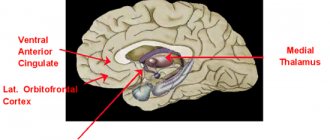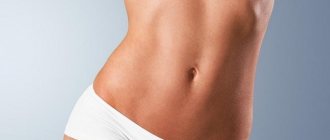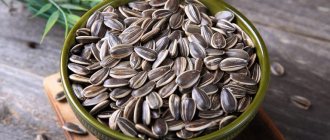Fanatical fitness trainers, bodybuilders and amateur nutritionists sometimes advise completely giving up carbohydrates (at least for a while) to correct your weight and figure. In sports, a significant reduction in carbohydrate foods in the diet is called “cutting”; in nutrition, this kind of diet is called a carbohydrate-free diet. And although it is the abuse of carbohydrates that most often leads to excess weight gain, today we want to tell you what awaits those who decide to eliminate them from their menu completely. So, here is a list of the consequences of a no-carb diet:
1. Frequent headaches
In the body, carbohydrates are broken down into glucose. With simple carbohydrates, this happens quickly, which causes a sharp jump in blood sugar levels; with complex carbohydrates, the same process occurs much more slowly, and blood glucose rises gradually.
When carbohydrates stop entering the body, it begins to extract energy from broken down fats. Lipids are not a usual source of energy, so our body needs to rebuild. While adaptation is underway, headaches and dizziness are guaranteed, and this will definitely take several days.
Are you really losing weight?
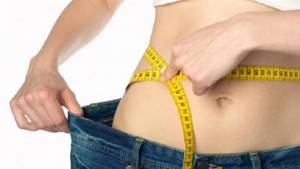
Critics of the low-carb diet argue that most of the weight lost is liquid. They are right. However, it's not that bad. The water accumulated in the body can add up to tens of kilograms, depending on the size of the person. If your diet is rich in salt and processed carbohydrates, the body actively accumulates unnecessary water in the cells. By cutting carbs, you get rid of this fluid and lose weight. However, some believe that carbohydrates are necessary to provide the brain with enough glucose to function normally. Your carbohydrate levels should be determined by your activity level. Of course, you should not use processed ones. However, some diets involve limiting any carbohydrate foods at all, including grains and vegetables. Keep this in mind when considering what changes to make in your lifestyle.
2. Constant fatigue
And although fats provide our body with energy, it is not exactly the kind that is formed during the breakdown of carbohydrates. This is why you will feel tired and sleepy in the morning. Please note that when there is a lack of glucose, the body goes into an energy-saving mode, so it tries to spend energy exclusively on vital processes, for example, breathing, the functioning of internal organs, heart contractions, etc. In addition, the brain feeds only on glucose; fats and proteins in the diet are not so important for it. When it is not enough, the brain begins to panic, it slows down all processes, which is why memory and logical thinking deteriorate, concentration decreases, and all cognitive functions slow down. Therefore, mental work during a carbohydrate-free diet will be a complete failure, as well as learning something new.
You will feel tired

When you cut carbs, you feel low energy. The body stores carbohydrates in the form of glycogen, which is a source of energy for the brain. When your body runs out of glycogen and ketones appear, you need to adapt. This will take some time, and in the process you will feel tired and have flu-like symptoms. Once you adapt, you still won't have the same stamina that you had when eating carbohydrates. Fats are a slow source of energy. The body cannot use them quickly during high-intensity exercise. If you lead a sedentary lifestyle, there will be no problem. If you are constantly training, you will need carbohydrates.
“We are still friends”: Derevianko commented on the breakup with his wife
If there is little snow, there will be no harvest: December 16 is Ivan the Silent Day
A Brazilian travels 36 km by bike every day to take his loved one home.
3. Mood swings
Again, due to brain stagnation, the nervous system loses control over emotions. The person becomes irritable and experiences constant mood swings.
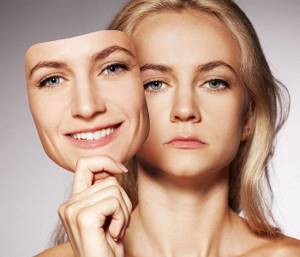
Women can be overly whiny and even hysterical, men can easily become rude and aggressive. Moreover, the weaker sex suffers more from a lack of carbohydrates, since their entry into the body triggers the production of the joy hormone serotonin, without which girls cannot feel happy and satisfied with life. In short, hypoglycemia on the background of a carbohydrate-free diet will turn you into a depressed person with obvious antisocial behavior. Are you ready for this?
You will burn fat
Low-carb diets help the body burn fat, which is what most people want to get from their diet. If you eat healthy fats, they stimulate the burning of stored fats in the body. Severe restriction of carbohydrates puts the body into a state of ketosis - in this state, ketones enter the blood, which appear when the body runs out of glucose. For obese people, this type of diet is effective in helping people lose weight and gain other health benefits. For example, studies have shown that such nutrition reduces the number of seizures in patients with epilepsy. This becomes a strong benefit of diets that support the body's process of ketosis.
6.Dehydration
Carbohydrates have the ability to retain fluid in the body. Therefore, with a low-carbohydrate diet, you can already lose several kilograms of weight in the first days - this is water that has come out (fat mass may remain at the same level).
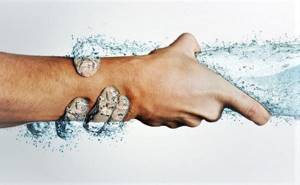
Losing weight through fluids is not a good idea, and, most importantly, it does not have long-term results. It is quite possible to develop dehydration, which negatively affects the functioning of all organs and systems of the body. Although, what to hide, on a low-carbohydrate diet, the body really becomes more prominent.
What happens if you completely give up protein?
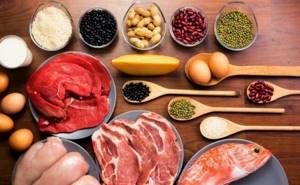
Proteins or proteins are the main building material of the body. Without them, the constant process of replacing obsolete cells with new ones will stop. Skin, muscles, joints, internal organs, hair, nails - their condition depends on proteins.
When ingested with food, proteins break down into amino acids, which the body uses to create its own proteins. They consist of 20 amino acids, 8 of which are essential and are found only in food. If they do not enter the body, the person may die.
The highest quality proteins are animal proteins, as they contain all the necessary amino acids. They are present in meat, fish, eggs and dairy products.
Among plants, legumes and all kinds of grains contain the largest amount of proteins. That is why vegetarians consume them in large quantities. For the body to function properly, it is recommended to consume 1 gram of protein per 1 kilogram of weight daily.
7. Eternal feeling of hunger
At first, you will definitely be haunted by a constant feeling of hunger. This always happens when blood glucose levels are below normal. Do not doubt, the body will persistently demand the return of its usual source of energy. This means that he will “reward” you with a growling stomach, increased appetite and obsession with food. To fill an empty stomach, you will have to eat a lot of protein foods, which take a long time to digest and provide stable satiety. However, an excess of protein nutrition can lead to another unpleasant consequence...
You will have bad breath

Most people following a low-carb diet that goes into ketosis notice bad breath. In addition, during the first stages of such a diet, your mouth will dry out, which also does not contribute to fresh breath. The only way to deal with the problem is to drink more water or chew parsley. Or start eating carbohydrates again.
8.Ketosis
Against the background of a lack of carbohydrates and a surplus of proteins, the body begins to use fatty acids as energy. This provokes the metabolism of ketone bodies and leads to the appearance of the characteristic odor of acetone from the mouth. If you test your urine for acetone, it will definitely be found in it. However, the acetone crisis has never benefited anyone: it causes a decrease in appetite and thirst, an increase in temperature, deterioration of the pancreas, nausea, dynamic vomiting, and loss of strength. The list of consequences is more than impressive.
You will feel less hungry
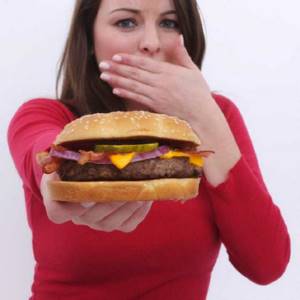
When we think of dieting, we imagine days or weeks of near-constant hunger. Some experts claim that a low-carb diet has the opposite effect. The connection between carbohydrates and food cravings is like an addiction. The chemicals in gluten are similar to morphine and the brain reacts to them in the same way. Other experts believe other carbohydrates are also the problem. People who are addicted to food should avoid sugar, bread, caffeine, dried fruits, bananas, corn products and alcohol. All of these foods can cause overeating. It is not surprising that low-carb diets exclude them too. If you eat protein, vegetables, berries, and healthy fats, you'll crave less junk food and feel less hungry.
Rare shot: Viktoria Isakova showed her grown-up daughter from Yuri Moroz (new photo)
It’s good to wash often: myths about shampoo and hair care that only harm
Lost weight: what Sofia Tarasova sacrificed for the sake of “VIA Gra” (new photos)
9.Changing eating habits
Under new conditions, your body will begin to gradually change its previous eating habits. The absence of simple carbohydrates in the diet leads to aggravation of food receptors, as a result of which fruits and berries seem much sweeter than before. This is certainly a pleasant moment, since after returning to your usual diet, you can easily give up sugar and sweets. However, the love for these products can be replaced by new food preferences, which do not always turn out to be correct. For example, instead of ice cream and cakes, you may suddenly fall in love with chips and fries, fatty burgers or smoked meats. Such new dietary preferences definitely do not bode well.
What's wrong with removing carbs?
At a minimum, a serving of vegetables contains 3-4 grams of carbohydrates. And the same amount, another example, is found in a handful of nuts. It turns out that by giving up carbohydrates, a person is forced to give up a lot of healthy foods.
- 312
More details - 594
More details
- 234 222
More details
- 162
More details
It is no coincidence that nutritionists talk about “bad” and “good” carbohydrates, as if hinting that if you give up, then only the former, such as processed grains and refined sugar. Losing weight and maintaining a healthy weight, preventing chronic diseases and optimizing digestion all require the presence of the right carbohydrates in the menu.
But what happens if you still exclude the maximum amount of carbohydrates from your diet:
10.Changes in hormonal levels
With a lack of carbohydrates and a hypocaloric diet, the production of the thyroid hormone T3 may decrease. In addition, it is likely that the production of the stress hormone cortisol will increase, which provokes the accumulation of abdominal (abdominal) fat and negatively affects the functioning of many internal organs and systems.
At the same time, many years of medical research have proven that a sharp deficiency of carbohydrates leads to a decrease in the level of the sex hormone testosterone in the body. If this is acceptable for women, then men may suffer noticeably, namely: their potency and sexual desire will decrease.
These arguments are quite enough to make you wonder whether it is worth practicing a carbohydrate-free diet at all. Be sure to weigh the pros and cons before starting such experiments with your diet. Wise decisions to you!

Thank you for taking the time to read this material. We appreciate your attention as it inspires us to prepare more valuable articles for you.
If you enjoyed this article, we hope you'll take a couple more seconds to give us a like. And we are really looking forward to your opinion in the comments about whether you have tried a low-carbohydrate diet at least once in your life, and what were its results?
What are the dangers of quitting carbohydrates?
The most popular way to lose weight is to reduce the amount of carbohydrates, even completely eliminating their consumption. The reason for this is the real effectiveness of the diet. Indeed, by removing carbohydrates from your diet, you can notice quick results. After all, it is carbohydrates that make up the majority of calories, and it is they that affect the body in the form of fat deposits. What types of carbohydrates are there? Depending on the body’s reaction [...]
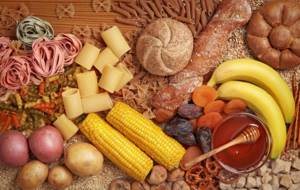
The most popular way to lose weight is to reduce the amount of carbohydrates, even completely eliminating their consumption. The reason for this is the real effectiveness of the diet. Indeed, by removing carbohydrates from your diet, you can notice quick results. After all, it is carbohydrates that make up the majority of calories, and it is they that affect the body in the form of fat deposits.
What types of carbohydrates are there?
Depending on the body's reaction to the consumption of carbohydrates, they are divided into 2 types: simple and complex or fast and slow. The first group (simple or fast) includes carbohydrates, which contain a lot of sugar, are broken down very quickly in the body and raise the level of insulin in the blood. Those who are losing weight are the first to exclude them from their menu.
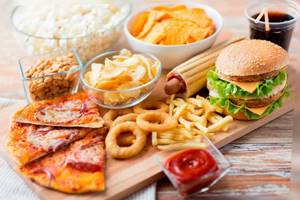
These include the following products:
- products made from plain flour: loaves, butter pastries, biscuits, cookies, cakes, etc.;
- potatoes and especially chips;
- any confectionery products made from butter and sugar: cakes, waffles, candies, bars, etc.;
- corn products: chips, flakes;
- sweet drinks: juices, soda, tea, coffee and cocoa with sugar, compotes, etc.;
- sweet dairy products: cheese curds, condensed milk, curd masses, yoghurts;
- fruits high in fructose: grapes, banana, watermelon, melon, etc.
The second group (complex or slow) includes carbohydrates, which give the body a supply of energy for a long period. This happens because they contain substances that slow down the absorption of sugar into the blood: fiber, proteins, pectin and others.
These are the following products:
- legumes: lentils, beans, peas, chickpeas, mung bean;
- cereals: wheat, oatmeal, pearl barley, barley, brown rice, buckwheat;
- whole grain pasta;
- bread and crispbread;
- vegetables: all types of cabbage and onions, cucumbers, peppers, tomatoes, zucchini;
- mushrooms.
Unsweetened fruits: citruses, plums, pears, cherries, apples, due to their high fiber content, can be classified as slow carbohydrates, but they are usually also limited in quantity and are advised to be consumed in the first half of the day.
Why can't you go without carbohydrates?
Despite the fact that excess carbohydrates lead to fat accumulation, weight gain, skin, hair and teeth problems, long-term abstinence from them can cause serious health problems. Low-carbohydrate diets are especially fraught with consequences for women - they disrupt hormones, cause disruptions in the menstrual cycle, reduce the possibility of conception and generally weaken the immune system.
This is why it is so important to maintain a balance of proteins, fats, carbohydrates and nutrients in your diet. When going on a diet, it is better to refuse or reduce to a minimum the consumption of only fast carbohydrates, which do not provide the same benefits for the body as slow ones.
Why is this happening
All our hormones are produced by three main glands: the pituitary gland, the adrenal glands and the hypothalamus. They are interconnected and provide the body with improved digestion, energy distribution, good mood, libido, immunity and other important functions.
A prolonged lack of carbohydrates puts the body into a state of stress. He feels exactly the same as if you deprived him of sleep or overloaded him with hard, exhausting work. The glands secrete stress hormones, a person feels tired, catches colds, and problems with the emotional state begin, which can lead to depression.
The female body cannot live for a long time without the required level of carbohydrates and remain healthy. With a diet that is fairly low in calories and carbohydrates, the cycle is disrupted very quickly. Your period may disappear for 2-6 months.
conclusions
If you are experiencing problems with excess weight and excess body fat, reduce the amount of fast carbohydrates you consume to a minimum, but in no case completely give up slow carbohydrates. Eat most of your carbohydrates in the first half of the day, giving preference to cereals, vegetables and bread. Eat at least three fist-sized servings of carbohydrates.
If you frequently go to the gym or engage in other activities at least three times a week, increase the amount of carbohydrates. Listen to your body: if you have problems with your cycle, irregular bowel movements, are constantly sick, do not get enough sleep even after a long sleep - pay attention to your diet! Swap bananas, chips and chocolates for beans, grains and vegetables and your body will respond with immediate results.
What signs can be used to determine the difference between a feeling of hunger and a craving for carbohydrates?
• The feeling of hunger (a biologically determined need for food), as a rule, makes itself felt in the form of such manifestations as rumbling in the stomach, poor health, headaches, etc. But at the same time, this can also be caused by the negative emotions experienced. So, it doesn’t look strange when a woman, breaking up with her loved one, tries to drown out the negativity with a large portion of ice cream, cakes, etc. And the point here is not that she wants to eat. No. She simply unconsciously wants to somehow reduce her negative state.
• If a person is truly hungry, this means that the specific food and drink does not matter to him. But craving manifests itself in the fact that a person passionately desires to eat something specific (french fries, a piece of cake, a chop, ice cream, etc.).
• In many cases, cravings are characterized by duration. In this regard, you can get out of this situation only by doing something closely that will allow you to switch your attention. But it should be borne in mind that hunger does not occur just once and at once. It is characterized by periods when it weakens and when it becomes stronger again. And with each return it becomes even stronger.
• When trying to satisfy a craving, at first the person feels great, but then gradually a feeling of guilt sets in.
• For women, the onset is typical during pregnancy and menstrual cycles.
• Cravings also increase if you refuse a product that contains “fast” carbohydrates.
• And even if you ate an hour or two ago, cravings may occur. As a rule, such hunger manifests itself several hours after the last meal.
Signs indicating a carbohydrate addiction
• In almost all cases, after the first bite or sip has been eaten, it is simply impossible to stop. It is unlikely that anyone will stop if they eat one piece of candy or a piece of French fries. And as a result, in any case, a person will eat more than he planned.
• Passion for sweets, baked goods and other products characterized by the presence of fast carbohydrates.
Subscribe to our Yandex Zen channel!
• A person has a weakness for foods containing a lot of salt and meat products. This is largely due to the fact that the body in all cases tries to find the necessary balance. And when a lot of carbohydrates are consumed in food, the body tries to restore balance with the help of salts and proteins. It will be exactly the same in the opposite case: with excessive consumption of foods high in proteins and salts, the body will signal the need for carbohydrates. Keep in mind that salt is mostly found in large quantities in restaurant foods, processed foods, and canned and processed foods.
• Although a person is not hungry, sweets are always an object of attraction for him.
• Sweets are consumed until a feeling of pleasure occurs. A person may not even be aware of this. Yes, he knows about the negative consequences of overeating, but he can’t help himself.
• There are frequent mood swings.
• A person is constantly haunted by a feeling of fatigue.
• Periodically headache.
• Often becomes depressed.
• The airways are filled with mucus.
• Periodic discomfort caused by the nasopharynx.
• Often feels sleepy.
But with all this, the good thing is that it is much easier to get rid of this addiction than those caused by other substances. First of all, you should admit to yourself that you are dependent on carbohydrates. It is significant that for the category of people under consideration, carbohydrates are the element that forms a significant share of the diet.
In addition, in fact, the use of snacks is not due to the fact that a person is hungry, but precisely to the need to activate happiness hormones. Because of this, such people can snack 15-20 times a day or even more.
A factor that clearly demonstrates addiction is also excessive consumption or infatuation with foods high in refined carbohydrates. And this must be taken for granted.
Next, you should begin to eliminate the psychoactive substance, since it is the restriction of carbohydrates that is the way that can actually cure addiction in people suffering from diabetes or excess weight. Due to such a restriction, it will be possible to restore previously lost control over the amount of food consumed.
Those who still continue to hold the opinion that limiting carbohydrates will have the most negative impact on brain activity should understand that the body can independently absorb as much glucose from non-carbohydrate compounds as it needs. This occurs during gluconeogenesis.
All types of substances that have a high concentration of carbohydrates carry a toxic risk for individuals suffering from obesity and diabetes.
However, you cannot focus only on the insulin index. If carbohydrate dependence is present, relying on the glycemic index will essentially be an attempt to control the use of substances over which control was previously lost. Making a comparison with addiction to alcoholic beverages, taking into account the glycemic index in this case can be considered as permission to drink beer, but at the same time a categorical “no” to vodka and other strong alcoholic drinks.
This is also true in terms of additives and flavorings. So, if you add white powder to chocolate or an electrolyte to sweet water, then these products will not become more useful for those experiencing excess weight problems and patients with diabetes. This trick is often used by many manufacturers to disguise a product that is a source of toxins.
Dr. Bruce Roseman, putting in incredible efforts and intense training, lost weight significantly twice, but after some time he quickly gained back his 30 kg. It all ended with the doctor being diagnosed with diabetes. After this, Roseman experimentally identified for himself those products that most provoke the onset of addiction. And on the basis of this, he subsequently successfully applied a similar exception both for himself and for those who received treatment from him.
No. 2 – problems with the gastrointestinal tract
The digestive system and gastrointestinal tract as a whole are also switching to a new way of eating. Hence - constipation, bloating, heartburn and discomfort. In addition to carbohydrates, the body ceases to receive a sufficient amount of fiber. Dehydration occurs. On a low-carbohydrate diet, a person is prohibited from eating vegetables, fruits, and cereals. This can cause diarrhea, sometimes acute. In order to avoid such consequences, you should not give up consuming a minimum amount of fruits or greens. If diarrhea has already become a pressing problem, it is better to abandon the diet without carbohydrates! Many people use additional fiber. They understand the consequences of giving up carbohydrates. Therefore, add pharmaceutical fiber to your diet.
Good Carbs
Not everyone respects carbohydrates, and recommends leaving only gluten-free complex carbohydrates in your menu (those that take longer for the body to process - so energy is released longer, and you have strength longer and the feeling of fullness lasts longer). In this case, it is better to choose those carbohydrates that, in addition to energy, also supply the body with trace elements, minerals and vitamins necessary for muscle development (that is, carbohydrates that provide additional benefits if you exercise after lunch):
- wild rice;
- quinoa;
- bread made from wholemeal and rye flour;
- beans and lentils.
It is not necessary to completely give up pasta, pizza and even desserts, the main thing is moderation, and the “until 14.30” rule. The trainer considers reducing the consumption of sweets and controlling sugar in the menu to be the basic principles of a healthy lifestyle, and implies that you have already passed this stage.

How much sugar can you consume per day?
It is enough for an adult to consume 20–25 g of sugar per day (4–5 tsp) to provide the body with energy. The maximum daily sugar intake should not exceed 50 g (10 tsp). For children, the sugar norm is 15 g per day, which corresponds to 3 tsp. It is important to take into account that these standards include sugar contained in natural products in the form of complex compounds, while the white sugar we are accustomed to should be completely abandoned.

We approach carbohydrates correctly
Truth is always in balance. Eat what you want and what makes you feel full and comfortable. Know when to stop and then you won’t have to refuse anything.
Eat rationally, do not follow the herd instinct to become an adherent of a fashionable diet. It’s normal to deny yourself very unhealthy foods. But giving up everything you love is not normal. A sweet dessert with a comprehensive healthy diet will not be a problem for you. On the contrary, it will lift your spirits and will not affect your figure.
The body does not lose weight under stress. It stores fat for survival. Thoughts about food, an obsessive desire to eat something forbidden, inevitably lead to stress, which means you won’t be able to lose weight.

It is important that 90% of the food consumed is healthy. Then it will be possible to leave room for not entirely healthy, but desired and loved, treats.
Don't leave yourself without carbohydrates. Choose the right diet and live in peace with your body. A diet on carbohydrates (proper carbohydrates) is possible!
No. 6 – hunger
As soon as the body stops receiving enough carbohydrates, the search for a new energy supply will begin. The smell of food or its sight will provoke a strong feeling of hunger. Another reason why weight returns quickly after such diets. Prolonged deprivation of carbohydrates increases the constant, chronic feeling of hunger. People with low willpower quickly break down and simply overeat day after day.
Conclusion: a complete refusal of carbohydrates can lead to irreversible consequences for the body.
The "morning carbohydrate" theory
In short, modern science states the following: carbohydrates are necessary for the normal functioning of our body, so excluding or minimizing their share in the menu is not recommended.
At the same time, it is indeed more difficult for people with slow metabolisms to maintain a healthy weight without reducing their carbohydrate intake, unless the bulk of carbohydrates are consumed in the first half of the day - in this case, the body has time to spend carbohydrate calories for a long time, and does not store them in reserve.

One of the main proponents of this approach is David Kirsch, trainer and nutrition consultant to Jennifer Lopez, who argues that pizza is not evil, and even those who gain excess weight just by looking at a bakery window can afford to eat pizza. Well, not every day, but not once a year on major holidays.
If you start planning your menu so that you eat all carbohydrates before 14.30, then your body will have enough time to process them and spend energy before the end of the day - it simply will have nothing to save. If at the same time you also go to training in the afternoon, then a combination of changes in the menu and physical activity will very quickly return you to lost shape.
